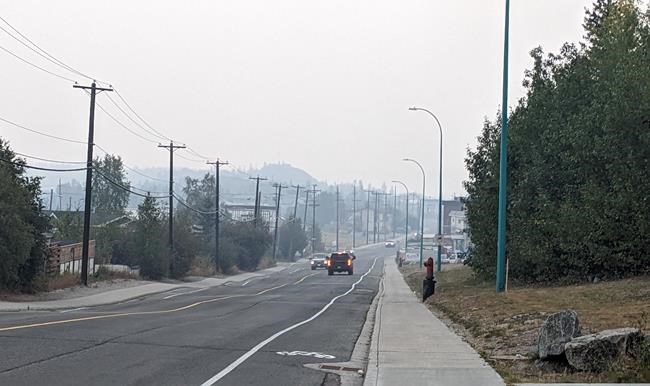YELLOWKNIFE — The shelves have been filled with food at the Yellowknife Co-op and the grocery store is preparing for thousands of people to return as an evacuation order is scheduled to be lifted Wednesday.
"I'm glad that tomorrow it will finally be over and people will be able to return to beautiful Yellowknife," said Justin Nelson, the grocery store's general manager.
Lifting the order remains contingent on fire and highway conditions, but N.W.T. wildfire information officer Mike Westwick said Monday that no challenges are expected for Highway 1 for the next few days.
Tuesday's cool fall air was welcomed in the territorial capital as familiar faces of essential workers started to stream back into Yellowknife to ensure that the city would be prepared for the return of residents.
Yellowknife city manager Sheila Bassi-Kellett said workers in grocery stores, pharmacies, home-heating providers, and even some taxi drivers and daycare providers, had already started to return.
The evacuation order for Yellowknife's 20,000 residents and those on the nearby First Nation communities of Ndilo and Dettah was issued on Aug. 16.
Days earlier, thousands of people living in Hay River and Fort Smith were ordered out, and they remain displaced.
Yellowknife officials said the city is getting ready for people clearing three weeks of food out of their refrigerators.
"We will be the second place they hit," said Nelson during a brief break at the grocery store.
"They will go home, check on their house (and) there will be a lot of spoiled food in their refrigerator."
The Co-op usually employs 160 people but is currently staffed with 22. They know there's a lot of work in the coming days, he said, but it will be worth it to see their friends, neighbours and families again after weeks of separation.
"The big win for me at the end of this is seeing my kids come back," Nelson said.
Cooler temperatures and firefighting efforts has improved the situation enough that the Canadian Armed Forces is also winding down its assistance in the Northwest Territories. At its peak, there were 350 deployed members, as well as air support.
The Canadian Armed Forces said that at this time there's been no request to help support return flights to Yellowknife.
The territory has been preparing for an influx of traffic on Highway 1 to Yellowknife. There are also preparations taking place for those who will return by air.
NWT Emergency Management Organization information officer Jay Boast said more than 2,000 people have registered for re-entry flights.
Residents have been advised they should prepare to be self-reliant for 72 hours upon their return.
"We are overjoyed that folks are coming home. It's been a very long wait," said Kieron Testart, who works with Yellowknives Dene First Nation emergency operations.
He said they plan to literally roll out the welcome wagon with big banners hung in town to show everyone how much they were missed.
Testart also hasn't seen his children or wife since the evacuation order was issued. He saw some children who had returned earlier Tuesday and became emotional.
"It's a bit of a shock, but it's a really welcome shock, because it reminds you this is coming to an end," Testart said.
While there has not been any reported destruction due to any blazes in Yellowknife, Testart said returning residents may be shocked by changes to the landscape from efforts to keep the flames at bay.
All the trees have been cleared on the road most people will take from the highway in Yellowknife and the boreal forest area has been left as rock, which Testart said looks like "the surface of the moon." On the eastern edge of town there is now a 100-metre fire break.
"I think you can probably see it from space," he said.
For northerners the land is home, he said, so seeing it differently will affect people. He said it will take time for life to return to normal.
"I think coming home is going to take an emotional toll on people."
This report by The Canadian Press was first published Sept. 5, 2023.
— By Kelly Geraldine Malone in Saskatoon
The Canadian Press



